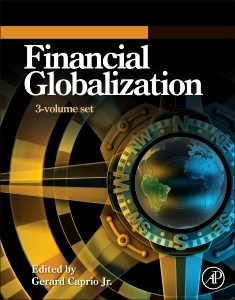Description
Handbooks in Financial Globalization
Editor-in-Chief: Caprio Gerard
Language: English
Subjects for Handbooks in Financial Globalization:
2188 p. · 21.4x27.6 cm · Hardback
Description
/li>Contents
/li>Readership
/li>Biography
/li>Comment
/li>
These three volumes present the full complexity of the history, practices, and outlook of 21st century global financial integration. The Handbook of Key Global Financial Markets, Institutions, and Infrastructure explores the growth of markets, intermediaries, rights, practices, and standards worldwide. The Evidence and Impact of Financial Globalization devotes separate articles to specific crises, the conditions that cause them, and the longstanding arrangements devised to address them. The Handbook of Safeguarding Global Financial Stability examines our political economy, particularly the ways in which formal and informal policies as well as financial theories and technical models inhabit our institutions, strategies, and tactics. For those seeking substantial, authoritative descriptions and summaries, these volumes will replace books, journals, and other information sources with a coherent, easy-to-use reference work.
Undergraduates and graduate students worldwide working in all areas of finance and economics. Researchers will typically be examining the global aspects and implications of their particular interests.
- Reveals and analyzes examples of financial integration in both triumph and crisis
- Features international perspectives on strategies and tactics for resolving crises
- Concentrates on economic and financial topics without introducing broader cultural subjects




